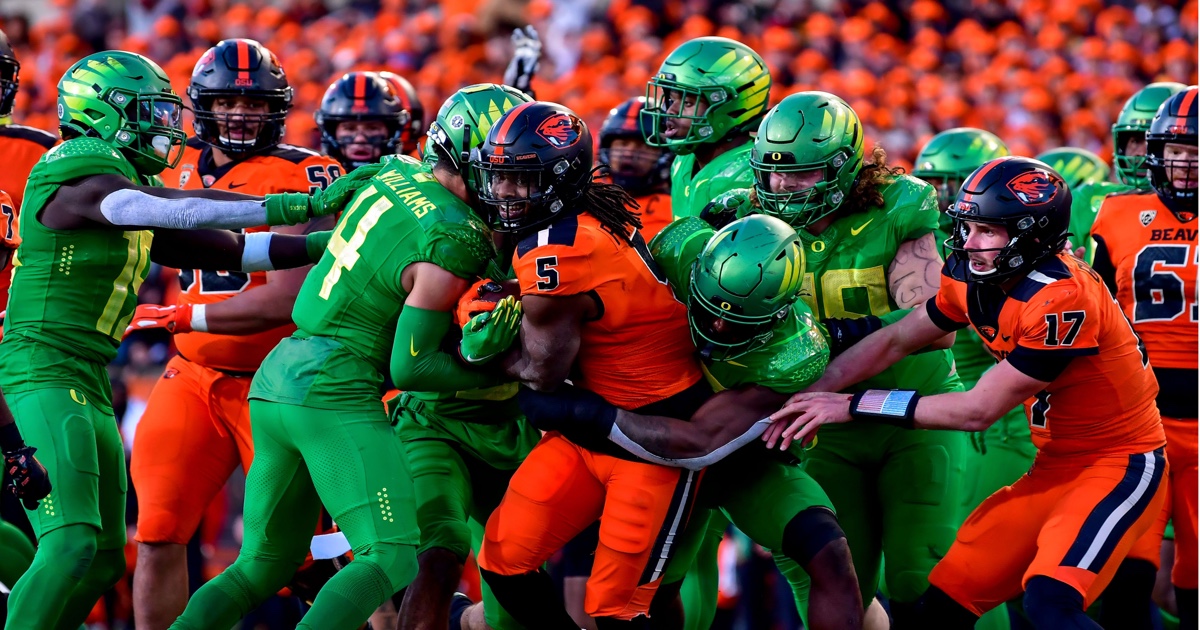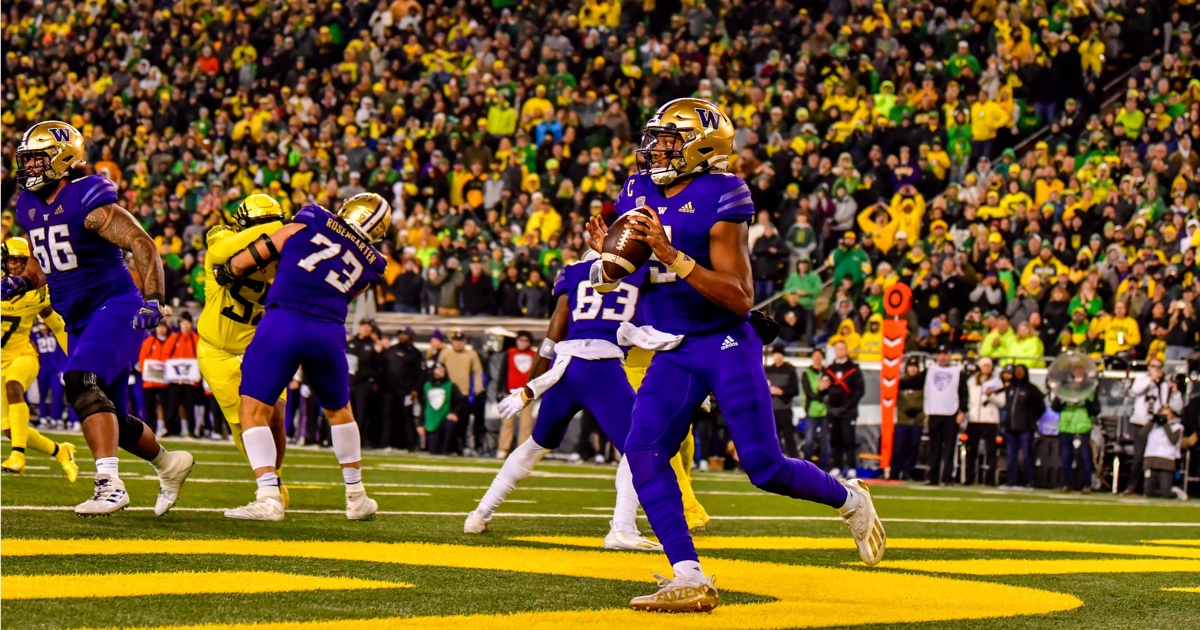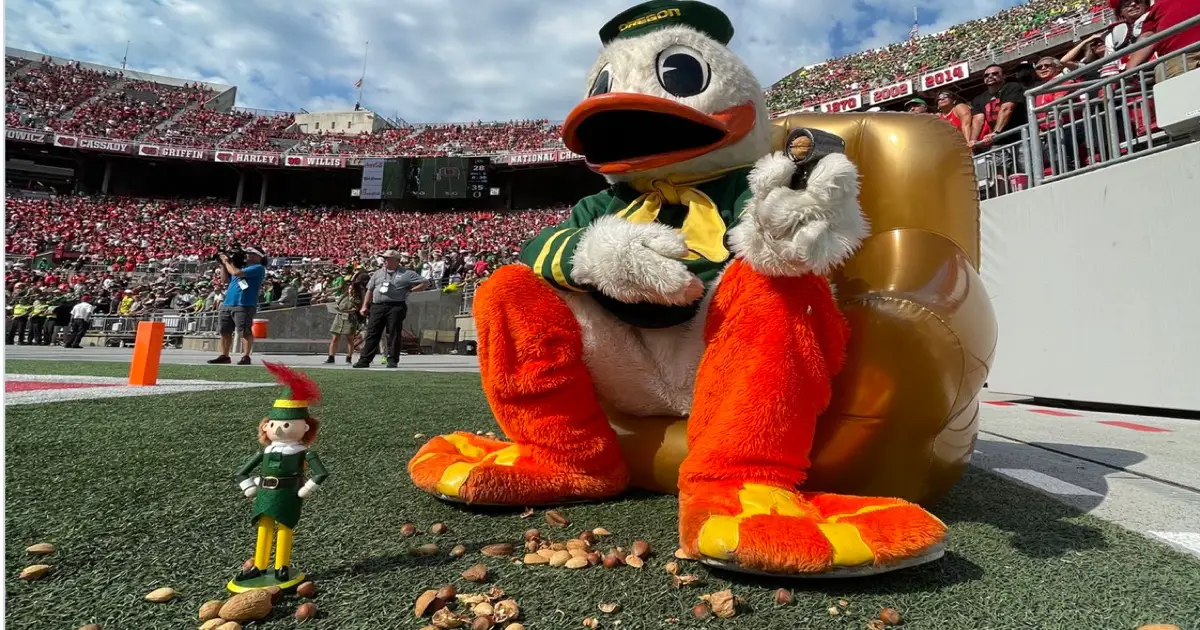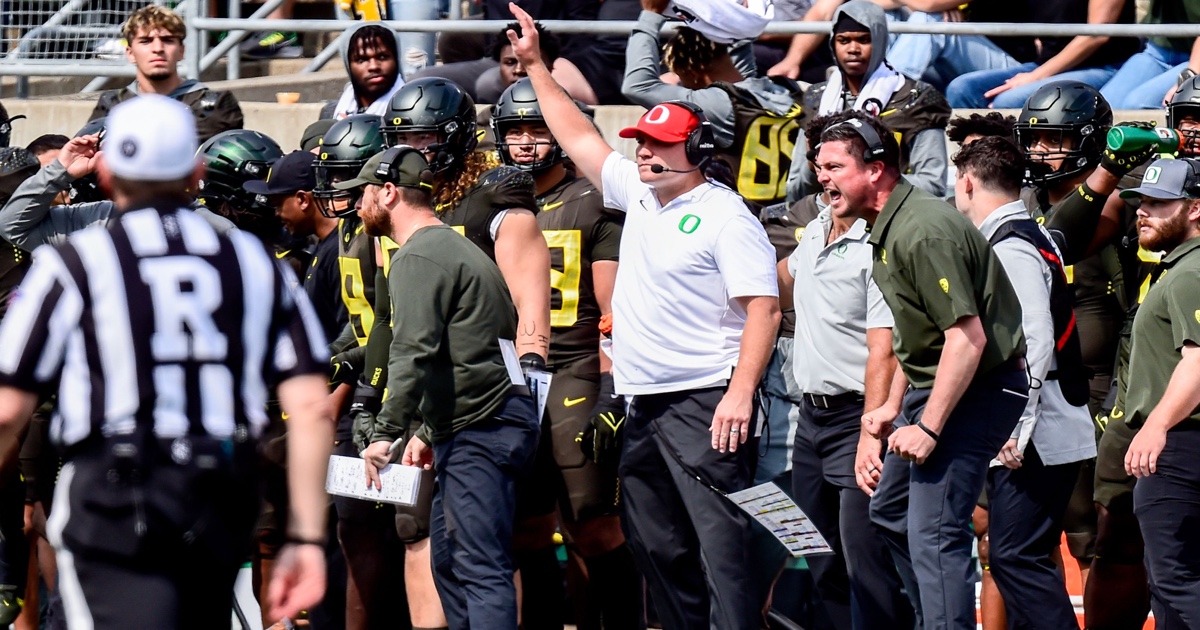Oregon just signed an outstanding recruiting class, No. 7 as of now, and did it by pulling players from a who’s who of legacy programs. Add that to Dan Lanning’s recruiting wins last year and we know that he and his staff can persuade top players to come to Eugene.
Which brings us to Wednesday’s bowl game–and the other half (or more) of building an elite program. How do these coaches handle coaching, particularly and acutely on defense?
We thought we had an answer to that for the eight games that followed the 49-3 debacle in Atlanta. But then came Washington — when the Ducks failed to adjust to the Huskies’ second half passing attack.
Worse, the Ducks closed the season with a mystifying loss to Oregon State — mystifying in that Oregon failed to adjust to Oregon State’s running attack by run blitzing or otherwise stacking the line of scrimmage.
For us bleacher bums, that bordered on coaching malfeasance. The Mario Cristobal Curse, second verse. Great recruiter, not so great at developing players or coaching in game.
Heading into tomorrow’s game, we bums want a win. But more importantly, we’re hoping Oregon’s coaches look smart and capable. If not, that No. 7 recruiting class could be heading down the Cristobal wormhole.

The Beavers shredded Oregon’s defense on the ground in the second half of the Civil War.
Five things to look for
One: Have the coaches kept the team focused or did the players get distracted by the San Diego sunshine and scene?
Oregon has lost focus and munched it in a few lesser bowl games over the last two decades. It’s not that they got beat. It’s that they looked bad doing it, to wit: Seattle Bowl, 2002. Wake Forest 38, Oregon 17. Las Vegas Bowl, 2006. BYU 38, Oregon 8.
(The second half Alamo Bowl meltdown against TCU in 2016 doesn’t count. Oregon raced to a 31-0 lead and then lost its QB. The offense sputtered and couldn’t keep TCU’s offense off the field.)
Two: Will Oregon’s defense adjust after the coaches get a look at North Carolina’s vaunted passing attack?
Last week FishDuck’s own DazeNconfused and Charles Fischer detailed disturbing flaws in Oregon’s defensive coaching that all but handed victories to Washington and Oregon State. Failure to adjust the defense as the Beavers’ running attack shredded it time and again left my bleacher mates stunned during the game, and again as we read the FishDuck analysis. Will the coaches adjust to North Carolina’s in-game adjustments?

Oregon’s defense couldn’t stop quarterback Michael Penix Jr. and Washington’s passing attack in the second half.
Three: Can Oregon pressure the quarterback?
This wasn’t exactly a strength of the Oregon defense this year, despite its featuring a handful of likely draft choices. One key is use of linebackers.
Lanning’s coaches didn’t use Noah Sewell and other LBs to blitz nearly as much as Cristobal’s staff did. Sewell wasn’t the wrecking ball he had been in past years — and will be in the NFL.
Four: How does the offense look without Kenny Dillingham calling the shots?
Many teams lose coordinators before bowl games, so this isn’t an alien concept. Lanning and his assistants need to show they know how to use that potent Bo Nix offense with its dominant O-line and gifted receivers and running backs.
Dillingham says the offense this year is a collaboration with the position coaches, which gave them buy-in on game plans and a deep understanding of the offense.
Given that, the assistants ought to keep that O humming, no?

The Duck, cracking buckeyes and other nuts in Columbus as Oregon beat Ohio State last season.
Five: How will the Duck handle the bowl game? Swim suit? Hammock? Rum swizzle? Who knows? The Duck is always original. I’m laughing already.
Oregon and North Carolina have never played a football game. North Carolina’s football mascot, Rameses, is mostly serious and fierce, a fine mascot as typical mascots go. He’ll strut out, flex and put up his dukes — and the Duck will give him a hot foot.
As they say, never get into an argument with a comedian.
Drex Heikes
Los Angeles, California
Top photo credit: Eugene Johnson
 Bob Rodes, the FishDuck.com Volunteer editor for this article, is an IT analyst, software developer and amateur classical pianist in Manchester, Tennessee.
Bob Rodes, the FishDuck.com Volunteer editor for this article, is an IT analyst, software developer and amateur classical pianist in Manchester, Tennessee.

Drex came to Oregon from the Alaska bush at a time that Dan Fouts, Ahmad Rashad and future New York Giant great George Martin (a freshman dorm mate) roamed Autzen. He was Emerald editor-in-chief before going on to a 44-year career at newspapers in New York, Alaska, Nevada and California. He spent half of his career at the Los Angeles Times, including stints in New York and Washington D.C. bureaus, where he was foreign affairs editor.
Drex worked in news, not sports, but did occasionally indulge his passion for football and once covered a tickertape parade for the New York Yankees. He directed investigative stories in 2008 that won the 2009 Pulitzer Prize gold medal for public service. He retired in Los Angeles but has a season seat at Autzen and flies up for most home games.

